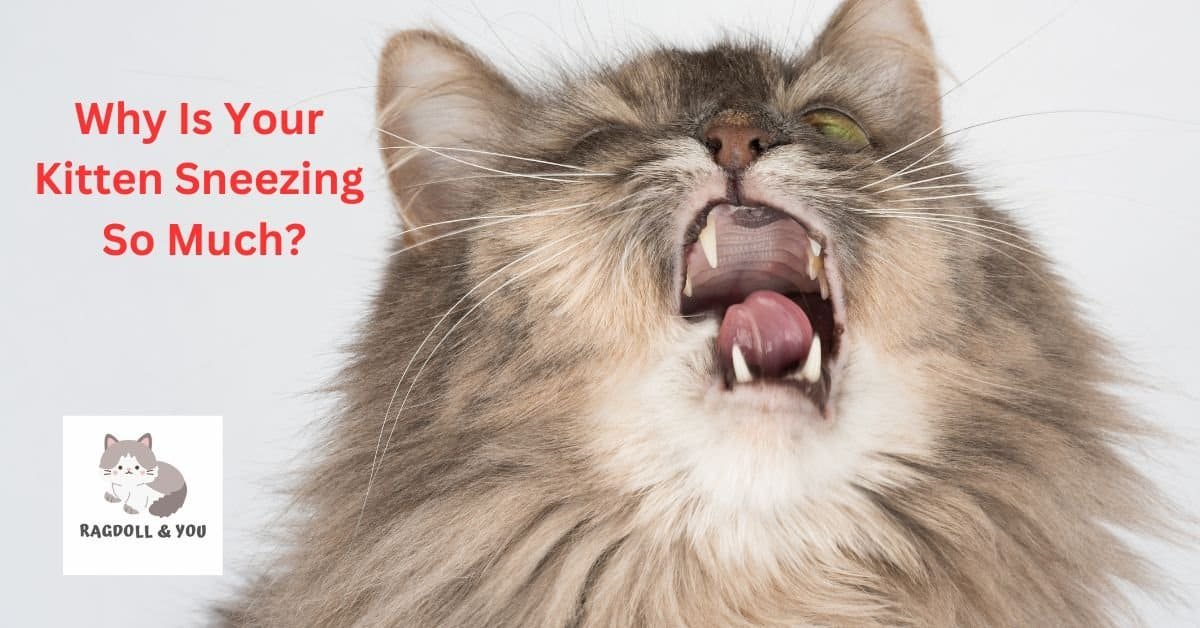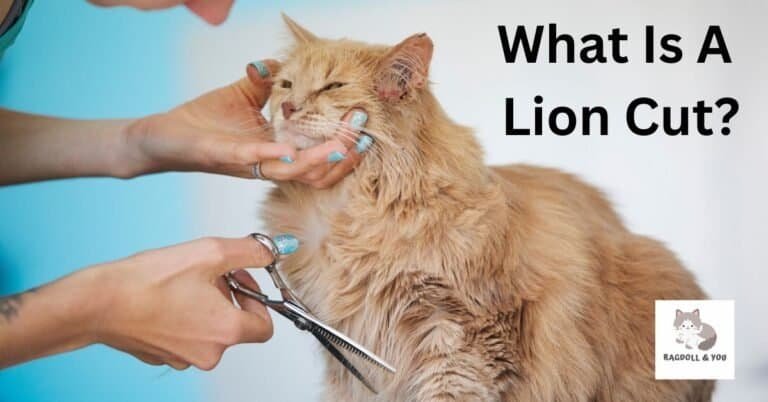Why Is Your Kitten Sneezing & Here’s What You Can Do?
It’s normal for cats to sneeze occasionally in response to irritants in the air. Much like humans, cats sneeze to expel air and particles from their nasal passages. Kittens may also sneeze when excited or after vigorous play.
However, persistent, frequent sneezing may indicate a respiratory infection. If infections in young kittens go untreated, they can potentially lead to feline asthma later in life.
You should consult your veterinarian if your cat has excessive sneezing and coughing. With proper care from your vet and supportive treatment at home, your feline companion can make a full recovery. An occasional sneeze is nothing to worry about, but ongoing sneezing episodes in your favorite cat warrant medical attention.
Key Takeaways
- Allergies, polyps or tumors, infected teeth, viral infections, and calicivirus may cause frequent sneezing in kittens.
- Sneezing in cats can be prevented by controlling household irritants, keeping a clean litter box, and preventing the spread of bacteria or viruses.
- Antibiotics, antivirals, nasal decongestants, and effective treatments are recommended and prescribed if the sneezing is severe or persistent.
- Veterinary care diagnoses the underlying cause of cat sneezing through physical exams and imaging techniques.
- Home remedies may relieve but should be used alongside proper veterinary guidance.
Causes of Sneezing in Cats
Cats with allergies, polyps, tumors, foreign debris in the nasal cavity, and feline upper respiratory infections are common culprits of sneezing in cats.
It may include Feline Viral Rhinotracheitis (FVR), calicivirus, and infected teeth.
Cat Allergies
Cats can get seasonal allergies, too. Like humans, cats may sneeze if they have a food allergy. It is less common in cats, but it still happens.
Some cats are allergic to dust particles, pollen, and mold. These things are found inside homes and can lead to sneezing.
A cat with allergies might also have itchy skin or watery eyes. Even their nose might run more than normal! If your cat has seasonal allergies, opt for a vet visit immediately.
Polyps, Tumors, or Foreign Objects in the Nasal Cavity
Cats can have a stuffy nose that makes them sneeze. This stuff can be polyps, tumors, or things cats pick up, like blades of grass. Nasal polyps are growths that are not cancerous.
They can get as big as 2 cm! These polyps and tumors may need a veterinary visit to take them out. Cats with this problem may have a runny nose, bloody nose, wet eyes, and bad breath.
They might also snore and make sounds like snorts when they breathe.
Feline Upper Respiratory Infections
Sick kittens or cats may result from upper respiratory infectious diseases. This sickness is not just a cold. Cats sneeze a lot when they have URI. Viruses, bacteria, and fungi cause the risk for infection.
The Feline Herpes virus, or FHV, often leads to this illness in cats. A vet may give your cat antibiotics or antiviral medications to help them fight the disease process.
Feline Viral Rhinotracheitis (FVR)
Feline Viral Rhinotracheitis (FVR) is a respiratory infection in cats caused by the felid herpes virus 1. It is highly contagious and can spread through direct contact.
Clinical signs of FVR include sneezing, nasal congestion, conjunctivitis, excessive blinking, squinting, and coughing.
This virus can also lead to secondary bacterial infections that worsen respiratory symptoms. FVR can cause long-term complications like chronic respiratory conditions and eye infection problems.
Calicivirus
Feline calicivirus is a virus that can cause respiratory tract infection and dental disease in cats. It spreads through infected cats’ saliva, eye discharge, nasal discharge, or mild sneeze droplets.
Outdoor kittens are especially vulnerable to this respiratory virus and may develop fatal pneumonia. Infected cats often have chronic sneezing and respiratory conditions.
Vaccinations can prevent calicivirus infection in cats.
Infected Teeth
Infected teeth can cause sneezing in cats. Root infections (dental disease) are among the common reasons for sneezing in cats.
The roots of the teeth are very close to the nasal cavity, which can make the cat sneeze. An infected or inflamed tooth root can lead to drainage and cause sneezing or sinus infections.

How to Prevent Sneezing in Cats?
To prevent sneezing in cats, control household irritants, and keep a clean litter box. Administer antibiotics if necessary and perform nasal lavage when recommended.
Control Household Irritants
To help reduce sneezing in cats, control potential irritants. Dust mites and perfumes can trigger environmental allergies, so keep the house clean by regularly cleaning and vacuuming.
If you or someone in your family is allergic to cats, consider wearing a dust mask while doing these tasks. You can also use hypoallergenic products.
Avoid using strong-scented cleaners or air fresheners that may irritate your cat’s respiratory system. Small changes like these can make a big difference in reducing sneezing for your cat.
Keep a Clean Litter Box
Keeping a clean litter box may reverse sneezing in cats. Allergies to litter can cause sneezing, so regularly clean the litter box.
A clean litter box prevents the spreading bacteria and viruses that could lead to fungal infections. Dusting and vacuuming floors more frequently also help resolve sneezing issues.
Antibiotics
Antibiotics can be an effective medical treatment plan for feline upper respiratory conditions. Veterinarians prescribe them to fight off bacterial infections occurring alongside viral infections.
Amoxicillin is a common antibiotic used in adult cats. But not all antibiotics suit every cat. Some cats may have allergies or adverse reactions to certain antibiotics.
Follow the veterinarian’s recommendations and monitor your cat closely during the treatment plan.
Antibiotics can also be used to treat feline herpes virus. It is a virus similar to the one that affects humans. In some cases, cats with herpes may develop secondary bacterial infections.
Nasal Lavage
Nasal lavage temporarily relieves cats experiencing mild symptoms. This involves gently flushing the cat’s nasal passages with a saline solution.
By doing so, irritants and mucus come out as nasal flushes, providing comfort for the cat. Nasal lavage does not treat the underlying cause of sneezing in cats.
Its primary purpose is to keep the mucous membranes and nasal passages moist. While it may alleviate some immediate discomfort, seeking veterinary care to address the root cause.

Symptoms of URI in Kittens
Kittens with upper respiratory infections (URIs) can display a wide variety of symptoms. One common symptom is sneezing, where the kitten forcefully expels air from its nose.
Another symptom is a runny or congested nose, sometimes accompanied by green or yellow discharge. The eyes may also be affected, with redness and discharge present.
Other warning signs of URI in kittens include coughing, conjunctivitis, and decreased energy levels. Some outdoor kittens may develop sores on their tongue, lips, nose, or roof of the mouth.
If your kitten shows any of these symptoms, it could indicate a respiratory infection that requires medical attention. Consult with a veterinarian for appropriate treatment.
Advanced Treatment for Sneezing Kittens
Advanced treatment may be necessary if your kitten’s sneezing is severe or doesn’t go away. In these cases, it’s best to consult a veterinarian.
They can determine the cause of the sneezing through nasal swabs and provide appropriate treatment. This may include medications like antivirals or antibiotics to address infections.
Nasal decongestants may also be used to reduce nasal congestion and improve breathing.
A variety of treatments like antihistamines, appetite stimulants, or subcutaneous fluids/intravenous fluids might also be recommended.
Treatment of Upper Respiratory Infections in Cats
Upper respiratory infections in cats can be treated with the following methods:
- Supportive Care: Providing supportive care is essential for cats with viral infections. This includes keeping them comfortable, ensuring plenty of water, and monitoring their symptoms.
- Antibiotics: A veterinarian may prescribe antibiotics to fight the infection and prevent complications if a bacterial infection is suspected.
- Antiviral Medications: Antiviral drugs can treat additional symptoms associated with upper respiratory infections, like lesions on the cornea and respiratory signs in young cats with acute infections.
- Home Remedies: Some home remedies may relieve mild cases of upper respiratory infections. It includes using a warm, wet cloth to clean discharge from eyes or saline nose drops to relieve nasal congestion.
- Veterinary Care: Seek veterinary care if a cat with an upper respiratory infection has severe symptoms or shows signs of not eating. A veterinarian can provide a proper diagnosis and recommend appropriate treatment options.

How Do Vets Determine the Cause of Cat Sneezing?
Vets determine the cause of cat sneezing through a physical exam, imaging, rhinoscopy, and nasal biopsy.
Physical Exam:
During a physical exam, the vet will check your cat for warning signs of respiratory infection or other health issues. They will inspect the cat’s nose, throat, and mouth for abnormalities.
The vet may also examine the cat’s eyes and ears for any signs of infection. They might use a special tool called an otoscope to get a closer look at the nasal passages.
This thorough examination determines the cause of your cat’s sneezing and plans effective treatments.
Imaging
Veterinarians use advanced imaging techniques like CT scans to determine why cats sneeze. CT scans give a detailed 3D picture of a cat’s head.
During rhinoscopy, biopsies can be taken from the nasal cavity walls. It is to check for inflammatory disease, fungus, or cancer that might make the cat sneeze.
The blood clotting system is checked when testing for sneezing and excessive nasal discharge in cats. It helps find any issues with blood clots properly.
Rhinoscopy
Rhinoscopy determines why a cat sneezes and has a runny nose. They do this by looking inside the cat’s nasal passages using a special tool called an endoscope.
This allows them to see the severity of infection, an inflammatory condition, dental issues, or cancer-causing symptoms.
Rhinoscopy can determine if the cat has inhaled something irritating or allergenic. It’s safe for adult cats but might have some side effects for dogs.
Biopsy
Biopsies can be taken to find out why a cat is sneezing. These biopsies involve collecting small samples from the walls of the nose to check for any organisms present.
They help determine if there is inflammation in the nasal cavity or if there are infections, fungi, or even cancer. If your cat’s sneezing becomes a long-term problem, your veterinarian may recommend biopsies.

FAQ
How Do I Know If My Kitten Has A Respiratory Infection?
Is your kitten constantly sneezing and has a runny nose or eyes? Do they seem tired or uninterested in eating? If yes, they may have a respiratory infection.
Other signs to watch out for include coughing and chronic breathing issues. Respiratory infections are common in kittens and is due to viruses like feline herpes or bacteria.
Do you notice a reoccurrence of symptoms in cats? Take them to the vet for a definitive diagnosis and intensive treatment. Left untreated, respiratory infections can become serious.
How Much Sneezing Is Too Much For A Kitten?
Excessive sneezing in kittens is abnormal. While occasional sneezing can be common, multiple daily sneezes may indicate an underlying condition.
Sneezing fits, persistent sneezing, or constant sneezing are all signs that something may be wrong with your kitten’s respiratory system.
When Should I Worry About My Kitten Sneezing?
If your kitten has more than an occasional sneeze, it’s time to be concerned. If it is persistent or accompanied by nose discharge, loss of appetite, or coughing, take them to a vet.
Sneezing can indicate allergies, upper respiratory diseases, or something stuck in their nose.
Will A Cat’s Sneezing Go Away On Its Own?
If your cat is sneezing, it is possible that the sneezing might go away on its own. Pay attention to the severity of symptoms.
Sneezing can indicate an upper respiratory infection or another underlying health issue. If it persists or worsens, seek veterinary care for your cat.
Keeping your cat’s environment clean and free from additional irritants helps prevent sneezing episodes.
How Do You Treat A Respiratory Infection In Kittens?
Respiratory infections in kittens can be treated with human medication, isolation, rest, and fluids. Your veterinarian may prescribe antibiotics to fight the infection and reduce symptoms.
Keep your kitten comfortable by providing a warm, quiet environment and ensuring access to plenty of water. Your vet may also prescribe an eye medication if your kitten has eye discharge.
Most cases of respiratory infections in kittens can be managed at home with proper care and veterinary guidance.
What Can I Do To Help My Sneezing Cat At Home?
If your cat is sneezing, there are a few things you can do. First, clean any discharge from their nose and face with a warm, moist cotton ball. This will help keep their nasal passages clear.
Warm up some canned wet food for your cat to encourage them to eat. Lack of appetite is common with sneezing cats. Look around your cat’s environment and see if there are potential causes.
They could be strong scents or dusty cat litter. Relieve your cat’s sneezing by monitoring your cat’s symptoms and taking these steps at home.
How Much Does It Cost To Treat Respiratory Infections In Kittens?
The cost of treating respiratory infections in kittens varies depending on the severity of infection and required treatment. Treatment for these infections is possible at home.
If veterinary care is needed, it may include antibiotics or other medications. The cost also depends on accurate diagnosis, tests, follow-up visits, and additional treatment measures.
Consult your veterinarian to get an estimate based on your kitten’s needs.







